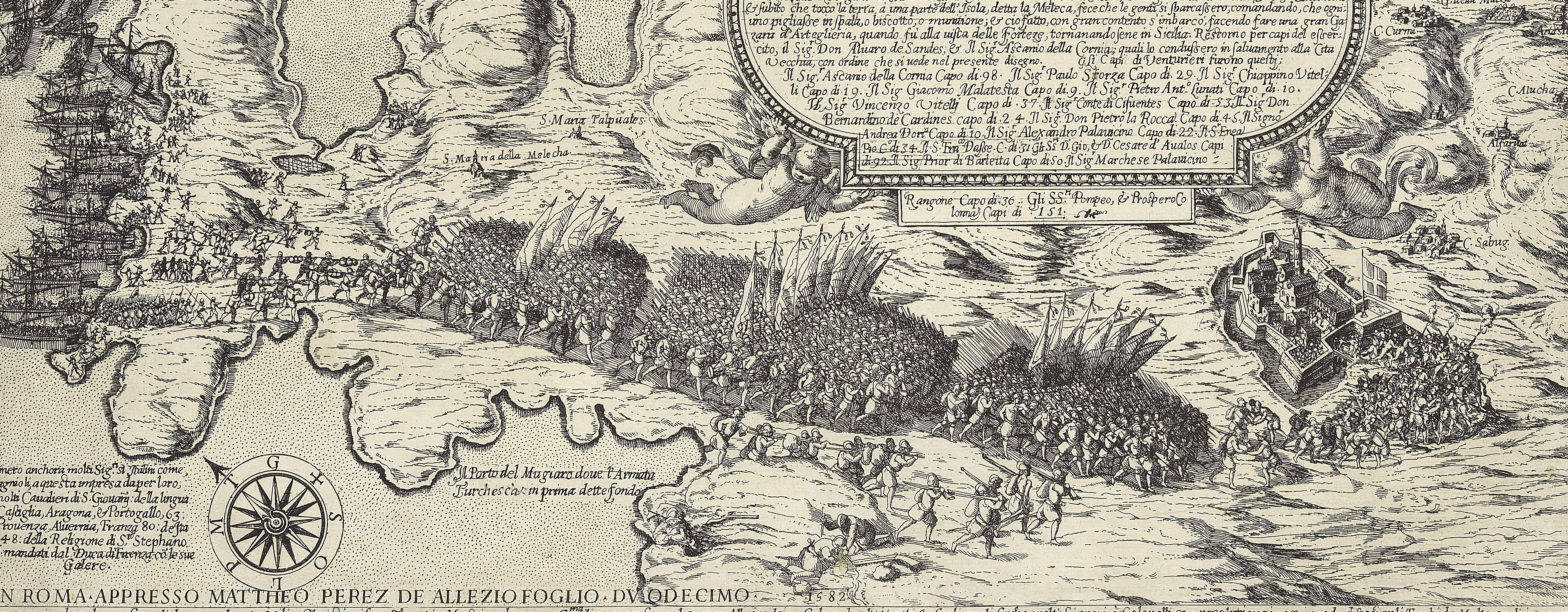
Ottoman-Habsburg Wars (1521-1791)
Images from eight wars fought between 1570 and 1718
View of the siege of Vienna, 1683 (Vienna, Austria) 48°12ʹ30ʺN 16°22ʹ19ʺE
1683 or laterEtching and engraving; printed on paper; gilt edges right and bottom | Scale: not stated. Not to scale | RCIN 724023
This view shows various stages of the siege of Vienna, which rages in full swing to the south-east of the city, where Turkish and Imperial (‘cesarei’) forces are fighting furiously near the quarters of the Turkish commander, the Grand Vizir. At the same time, the Turks can be seen in flight towards the south-west (top right).
The view is taken from the encampments of the Imperial armies, looking south-east across small islets in the Danube on which can be seen the abandoned Ottoman cattle, horses, a camel, and carts. A relief force of Imperial troops rides towards the city while, in the left foreground, a skirmish takes place between the Turks and the Imperialist on an islet named Proter. This name is preserved today in the Prater Spitz.
The layout of the city has not been shown; instead, the blank space inside the fortified walls has been used to accommodate the names of the bastions (‘Boluardo’, i.e. baluardo) and gates. The curved trajectories of the mortar bombs, shown by dashed lines, illustrate the fire from the Turkish mortar batteries (‘Bomba’). The Turkish trenches, which were dug to allow a protected approach to the walls of the city, are drawn by pairs of parallel lines crossed by one pair of longitudinal lines drawn at right angles.
Condition: no fold lines; central crease line; ink smudges to top left and bottom left platemarks, perhaps made during the printing process; small contemporary ink smudges in places around the image; pressure marks can be seen from the mounts of items which were kept above this map in a former collection. Verso: top right, ink smudge; small black ink blots.
François Collignon (c.1610-87) (print seller) [bottom right, inside neatline:] Si vende. da fran.co Collignon nel Parione con licena de Sup.ri Rome
Subject(s)
Army-TurkeyArmy-AustriaWatermark: The letter M above a fleur-de-lys on three hills in double circle
Condition: no fold lines; central crease line; ink smudges to top left and bottom left platemarks, perhaps made during the printing process; small contemporary ink smudges in places around the image; pressure marks can be seen from the mounts of items which were kept above this map in a former collection. Verso: top right, ink smudge; small black ink blots
Scale: not stated. Not to scale.
27.6 x 35.3 cm (image and neatline)
28.1 x 35.4 cm (platemark)
39.4 x 51.4 cm (sheet)
Printed title:
VIENNA / LIBERATA [centre of print]
Annotations:
George III heading: Vienna besieged by the Turks from the 12.th of July to the 13.th of Sep. 1683.
Other annotations: (Recto) none. (Verso) [top left, black pencil:] IV/45.
George III catalogue entry:
Vienna A Plan of Vienna besieged by the Turks and delivered by the King of Poland and the Duke of Lorraine on the 13.th of Sept.r 1683: by F. Collignon.
Subject(s)
Vienna, Austria (48°12ʹ30ʺN 16°22ʹ19ʺE)
Page revisions
21 July 2024
Current version






